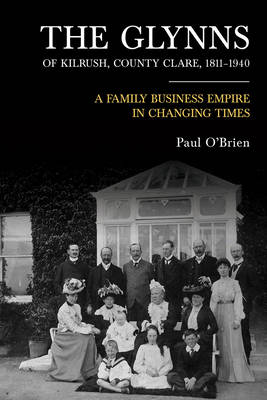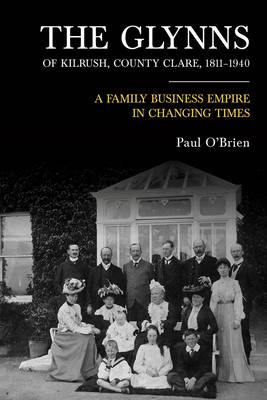
Door een staking bij bpost kan je online bestelling op dit moment iets langer onderweg zijn dan voorzien. Dringend iets nodig? Onze winkels ontvangen jou met open armen!
- Afhalen na 1 uur in een winkel met voorraad
- Gratis thuislevering in België vanaf € 30
- Ruim aanbod met 7 miljoen producten
Door een staking bij bpost kan je online bestelling op dit moment iets langer onderweg zijn dan voorzien. Dringend iets nodig? Onze winkels ontvangen jou met open armen!
- Afhalen na 1 uur in een winkel met voorraad
- Gratis thuislevering in België vanaf € 30
- Ruim aanbod met 7 miljoen producten
Zoeken
The Glynns of Kilrush, County Clare, 1811-1940
A Family Business Empire in Changing Times
Paul O'Brien
Paperback | Engels
€ 31,45
+ 62 punten
Omschrijving
The book examines the fortunes of a provincial, entrepreneurial family, the Glynns of Kilrush, County Clare, who came to local prominence in the early years of the nineteenth-century. It explores their networking strategies and acumen, and traces the rapid expansion of their business activity from small-scale corn millers to proprietors of a multifaceted enterprise. It examines the rapid expansion of their various enterprises from milling to shipping and railways. Paul O'Brien places the Glynn family and businesses within the wider context of networks developing between the urban, provincial and metropolitan industrial class. Networks which helped shape Irish society and its economy. It examines the family primarily from a social point of view while also exploring the family's business and trade enterprises. It addresses the issue of middle-class identity, examining the ways in which it was constructed and represented to the wider community. The book also explores the mechanisms that were used by the middle classes to establish and maintain their economic, social and cultural hegemony, and how these were reproduced down the Glynn generations. The book was helped by the availability of a superb, hitherto undiscovered, family and business archive belonging to the Glynn family. The most fascinating aspects discussed in the book are the interactions between class, networking, local administration, associational culture, education, religion, the Glynn women and last, but by no means least, the town of Kilrush itself where the family still remain based.
Specificaties
Betrokkenen
- Auteur(s):
- Uitgeverij:
Inhoud
- Aantal bladzijden:
- 224
- Taal:
- Engels
Eigenschappen
- Productcode (EAN):
- 9781846827761
- Verschijningsdatum:
- 26/04/2019
- Uitvoering:
- Paperback
- Formaat:
- Trade paperback (VS)
- Afmetingen:
- 155 mm x 231 mm
- Gewicht:
- 317 g

Alleen bij Standaard Boekhandel
+ 62 punten op je klantenkaart van Standaard Boekhandel
Beoordelingen
We publiceren alleen reviews die voldoen aan de voorwaarden voor reviews. Bekijk onze voorwaarden voor reviews.











